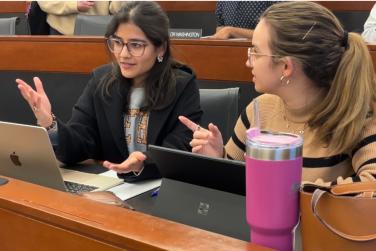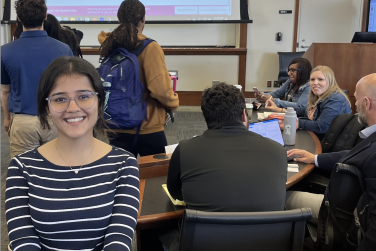
First Year Coming to an End! What I Wish I Knew in the Beginning
As my first year in the MHRM program is coming to an end, there are many things I wish I knew in the beginning that I learned throughout. Here are the top four things I wish I had known in the very beginning.
Adjusting to Night Classes:
Coming straight from undergrad, night classes were not something I was particularly used to. It was a huge adjustment for me in the beginning and here are some things I wish I knew when I started those classes. The first was to make sure that I had all of the homework I wanted done that day done before 6pm. This then gave me the option to come home from class and only have to focus on reflecting what I learned that night. Eventually, I started to spend 30 minutes after class to quickly go over notes from that night which helped me retain more information than I thought it possibly could.
Being extra prepared to class was something I learned later on. Of course coming to class having completing all assignments is number 1, but there were other things I eventually learned to bring to class as well. Three hour courses at night can take a lot of energy, so having items that help you keep up that energy is important. Always bring fluids to class, whether that just be water or coffee/soda to give you that extra caffeine boost. In the beginning when I would forget my water, those 3 hours could feel a lot longer. It’s also helpful to bring a small snack (if the professor allows), like a granola bar.
Group Work:
Coming into the program I knew I would be working closely with others, what I know now is just how integral group work is to the program. Almost all of my classes thus far have included a group project to some capacity. As working with others has not been a problem, what has been a journey to figure out is how to manage all of the group work as everyone has polar schedules.
Group work best practices I have learned over this past year are many, but these are the top 3. First, as soon as you know who your group is, create a platform that you can all communicate on (I have used GroupMe the most). Second, even if your project is not due until the end of the semester, have an initial meeting right away to just go over what the project is about and what it will entail over the course of the class. Doing this together is so important because the last thing you want is to start the project and have everyone understanding the concepts differently. Be on the same page from day one. Third, take the time to understand everyone’s schedules and create your own timeline. As everyone in the MHRM program has extremely different schedules, compare them and come up with at least one day and time that you would be able to meet together whenever needed. Often times that ends up being directly before or after class. After you have at least one common day that you’d be able to meet, create your project timeline of personal due dates for all sections of the project. This has helped me tremendously to meet or supersede official due dates. These three steps may seem small, but they are so important for group success and ease.
Case Competition:
One amazing opportunity that MHRM students get to experience is the case competition. It is real world application of what you have been learning to an actual problem a company is having. One thing I wish I had done in my first semester was speak to more students about their experience within the case competition and how to best prepare for it. One piece of advice I have for any incoming MHRM student is to speak to someone who has done the case competition and find out what their biggest pieces of advice would be.
Believe in yourself, don’t push too hard:
This is honestly a lesson I wish I had learned in undergrad as well. But my top lesson that I have learned throughout my time in the program is that if I want the best quality work, I need take care of myself first. There are so many resources to reach out to when I am stressed so that I am not putting so much pressure on myself. First of all, I learned to reach out to other students in my class to work together on studying or compare notes so that I didn’t feel so alone in what I was doing. Instead of going through trial and error on how to best prepare for classes, reach out to second years who have already taken the class to learn how they best prepared. Also reach out to professors if you are starting to feel stressed. They want to see you succeed and will help you in any way that they can.
In undergrad, I felt that I needed to cram and spend time doing homework until 3am to feel prepared, but I realized that my best work was not coming out of that situation. Instead, I broke those habits, worked on getting healthier habits, and have seen my work get better. I have found the most helpful tool for me is giving myself a cut off time at night to stop doing homework and let my brain rest. And while doing schoolwork, take breaks of maybe 10-15 minutes and regroup after the break. Quality work comes from a healthy mind.







